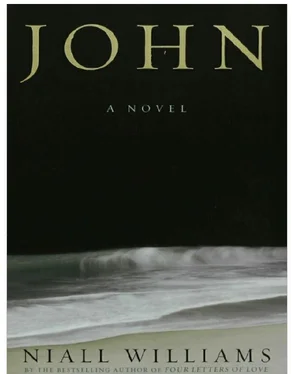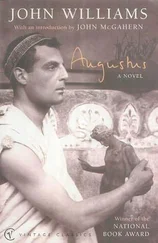The Apostle pauses. He has preached the scene many times in far places. He has remembered often sitting in the starlit night when Jesus spoke the words for the first time, when the lemon trees were in bloom and the air sweet.
He leans close to the scribe. He touches with his fingertips the eyes, discovers that Prochorus is dead.
Anger and grief course through him. John stands up, a pale figure before the dawn, and when he speaks there is violence and hurt in his voice. The other disciples are gathered at the doorway, Matthias now among them.
'The light has come into the world, our Lord said, but men have preferred darkness to light,' he cries out, 'because their deeds were evil, for everyone who practises wickedness hates the light and does not come near the light for fear his deeds will be exposed.'
His chest heaves. It is not clear if he knows that Matthias is there, or whether he thinks there are others, too, who no longer believe as he has told him. He stands and is a glimpse of his younger self, fierce and loyal and resolute. His lips quiver with anger. It is as though he sees in the landscape of his blindness a vast temple begin to crumple, and he throws out his hands to hold it up.
Abruptly he pushes forward and knocks a stool. Papias steps quickly to his side, offers his shoulder for his master's hand, and they go past the others outside to where the dawn is not yet risen and the wind gone elsewhere.
The scribe is buried in a mound on the cliff top, his face towards the east. Stones are piled above him, their soft clack a doleful music. The disciples stand and pray. John is not with them. He has told Papias to leave him, and his absence is felt but not spoken. Old Ioseph leads the prayers. Matthias stands by his side with two others, Auster and Linus. The ceremony is short, Ioseph's voice thin with grief. For each there is a sense of betrayal of which they cannot speak. How has this happened, that their scribe has been struck down like this? That one who gave so much of himself to the service of the Lord has been visited by this plaguey death? Why has he been taken from them? The air above their heads is crowded with questions. The death threatens the unspoken belief they have in being chosen, in being set apart. Not because they have imagined themselves free from dying, nor because they have taken as a sign the great age of the Apostle and believed they, too, will outlast all perishing until the dawn of the Second Coming, but because Prochorus was not old. Because his role in their community was to record, and the taking of him seems an act full of portent, as if their tongues have been pulled out. All have expected the Apostle to have further revelation, and for Prochorus to be on hand to write it down. Now his death seems a wilful silencing. The disciples voice no protest. Some of them, bowed, mute, with vigilant rigour tour the inner rooms of their souls and find evidence against themselves — jumbled furniture of doubt, unbelief, false piety, pride — and leave to begin atonement.
Among them Papias harbours the greatest guilt. He fears he brought the sickness to the scribe, but has told no one. He has no sign of it on himself. When the disciples leave the burial mound, he hurries away down the rocks to the shore. His face is white, his eyes glitter like fish scales. Arriving on the soft pebble-and-shell floor of the departed tide, he slips and sinks in haste, his sandals are unfooted as he steps forward into the shallow waves. There, grey corona of gulls turning above him, he bends and dips his hands in the salt sea and rubs them hard together. Again and again he dips and draws the water and scrubs the invisible from his hands. The waves are against his calves, his robe darkly stained to his waist. Against the backs of his legs and beneath his feet he feels the suck of the out-flowing sea. His actions are uncalled for. He has already tumbled entirely in the waves since visiting the fisher's wife, but nonetheless scrubs now at his hands with a wild passion for absolution. He knuckles one palm then the other, presses his fists through the cold surface of the sea and holds them there as if manacled. The gulls wheel, waiting to see what strange fish may appear.
By the time Papias is done, his hands are as red as if hell-burnt. He comes from the sea shivering, and Matthias is standing nearby watching. Two paces behind him stand Linus and Auster.
'Young Papias,' Matthias says, 'what troubles you?'
'I did not see you there.'
'You were occupied intently.'
Papias turns back to look at the sea, as though a plausible reason may be written there.
'How cold your hands are,' Matthias says, stepping closer and for an instant taking the reddened fingers in his own. 'Are you suffering some ailment?' Matthias's voice is soft and comes about like a velvet cloak. His eyes are darkly inviting. 'Papias, tell me,' he says, and lets go the hands.
'No. No, I am well. It was something from the cave, something on my hands,' Papias tells him, tells the others behind him, folding his arms so the evidence is tucked beneath them. He feels the lies multiply like flies around a rotted fish. 'I was foolish. I thought it might be. . I thought there might be disease.'
'You are upset by the death of our dear Prochorus.'
'Yes.'
'Indeed are we all. He is a grievous loss.' Matthias looks to the others and nods towards them. 'But he is now in everlasting life, therefore why should we mourn? Don't you believe so, Papias?'
'I do.'
'What does the Ancient say? What does he say about the death of our scribe?' Matthias is close enough to kiss Papias on the cheek, the cloak tightly enwrapped.
'The Master has not spoken of it.'
'Truly?'
'Truly, he has not.'
'Not of Prochorus. Nor of me?'
'No.'
'You find no comfort in that, I am sure. I find no comfort in it. Indeed it is troubling that he has not offered us wisdom.' Matthias looks out into the sea. 'He is himself perhaps unwell. Have you remarked it?'
'The Master?'
'Yes.'
'No, I have not.'
'You may have other concerns. Let me ask you, Papias, do you think the Lord God wishes us to remain here?'
'The Master says so.'
'Indeed.' Matthias considers the sea a moment longer then turns to face the youth. He smiles and says, 'Does the Lord speak only to him? Curious if one blind old man was to be the only ear for the heavens.' Slowly he shakes his head. He places one hand on the other's shoulder. 'Did not the Lord speak unto Moses and say, "Speak unto all the children of Israel and say unto them: You shall be holy"? So it is written in scripture, Papias. Yes, dear brother, surely there is more discourse between heaven and earth than to one Ancient. The Lord does not speak to only one. But we will talk again of this, you and I. I can see you are anxious to be elsewhere. Perhaps Linus will attend to the Master and allow you. .' Matthias throws open his hands. 'Go wherever it is that presses on your mind so.'
'No, Matthias.'
'O, yes, I insist. It is small charity to attend to yourself, Papias, that you may better serve. You are free, I relieve you.' He turns to those behind him. 'Linus, go and serve the Ancient, our beloved apostle.'
'He does not like to be called that,' Papias says quickly.
Matthias spins about as if stung. 'Truly?'
'Yes.'
'And why not? Is he not the Beloved? Was he not the one our Lord Jesus loved the best? Who sat at the right hand? Who laid his head upon his breast? Surely he was the Beloved? Or am I mistaken? Does my memory go? Or is it his? Who does he say he was now?'
'No. No, his memory does not.' Papias's cheeks burn. Matthias's eyes are dark. He is close. His gaze seeks entry to secrets. Behind him at two paces the short, squat figure of Auster watches, and on the near stones Linus, fair-haired, slim, tall but stooped, shoulders curved forward as if to hide himself from the slight wind.
Читать дальше










